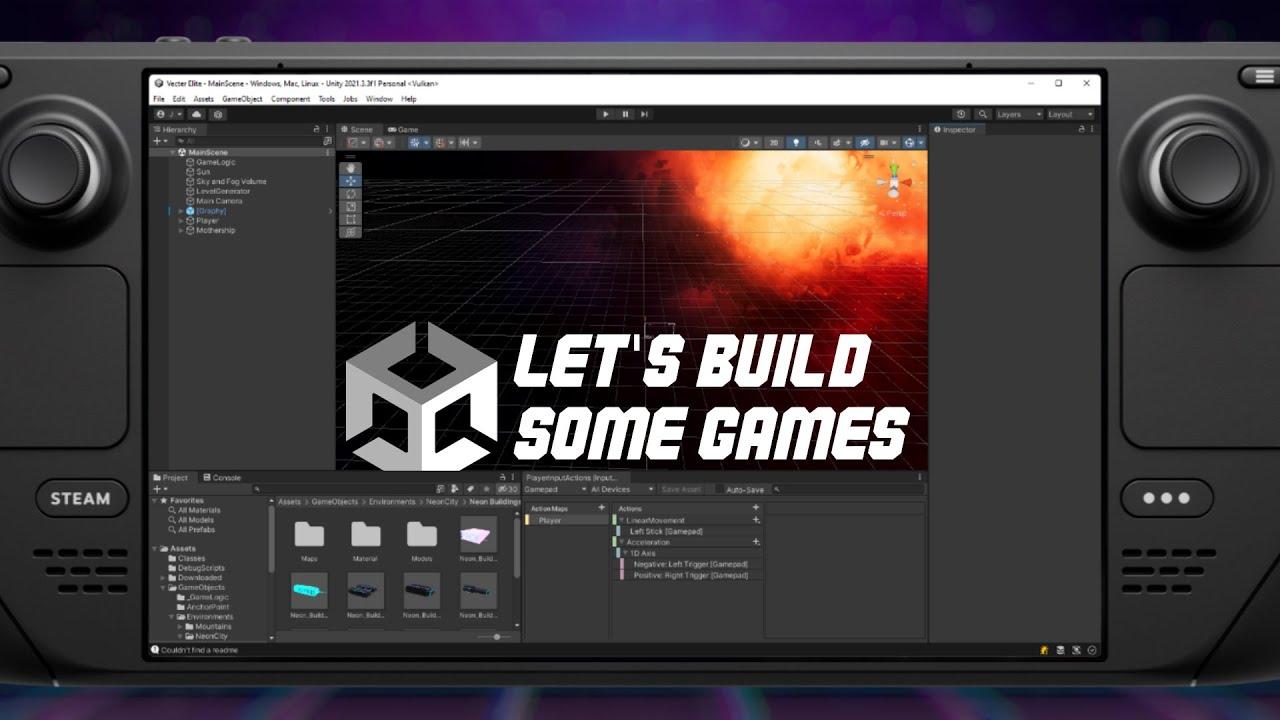Part of the power of the Steam Deck is that not only is it a great portable for gaming, it's Linux and has a full desktop mode and so you can also create games with it.
There's a ton of game engines out there that support Linux natively including Godot Engine, Unity, Unreal, Defold, GDevelop and the list just goes on and on. Game Maker too, although they only officially support Ubuntu right now and it's in Beta.
YouTuber Taranasus Videos decided to actually attempt to build a game on the Steam Deck and play it on there. Obviously to do this you really would need to hook it up to a monitor, with a mouse and keyboard but the point is that it's absolutely possible to do. Not only that, it gives developers a pretty good baseline for what to optimize against too. The idea has Valve excited too, with designer Lawrence Yang mentioning on Twitter "Hey look, game development on Steam Deck, no other PC required! This is one of the things we were really excited about enabling with Steam Deck, and it’s awesome to see folks already getting their feet wet.".
Really fun to see things like this, how you can just download a game engine onto a Steam Deck and get going.

Direct Link
I wouldn't be surprised if we see plenty more of this. We've all seen how devices like the RaspberryPi opened up a new world to people, seems like the Steam Deck could too.
There is a good 'should' reason for why you should develop a game on the Steam Deck.
If you're targeting the game running on the Steam Deck, developing it and running it on the Steam Deck is a great way to test the game as you're making it.
Luckily we have Godot :) So I'd encourage anyone looking to develop games on their Steam Deck to pick that up instead! It's a very fun engine to mess around with, and it's free and open source.
Nostalgia is a great thing.
The notebook I gave my kids is... a decade old. It "works" though. A Deck would pretty much quadruple processing power over it though
Loved his video.
There is a good 'should' reason for why you should develop a game on the Steam Deck.
If you're targeting the game running on the Steam Deck, developing it and running it on the Steam Deck is a great way to test the game as you're making it.
Not really. As a software developer myself, you will have to do A LOT of code builds so, developing a game inside steam deck is not ideal because it will possibly slow you down. It's better to have a real desktop or laptop for coding. Now for testing, it kind of makes sense. But testing is another step in the development process.
Another point is that noboddy will seriously think on doing games specifically for steam deck because it will limit you in terms of sales.
Last edited by eldarion on 13 Jul 2022 at 4:40 pm UTC
Last edited by Liam Dawe on 13 Jul 2022 at 5:30 pm UTC
As a software developer myself, you will have to do A LOT of code builds
Hey, that's what build farms are for :)
With huge amounts of RAM, CPU and storage for debug info and compiler cache!
Last edited by MayeulC on 13 Jul 2022 at 7:25 pm UTC
Another point is that noboddy will seriously think on doing games specifically for steam deck because it will limit you in terms of sales.Well, sure, if you mde a game that could only run on the Steam Deck, but I'm not sure that sort of exclusivity is even possible.
making flappy birds.
after a few minutes, the conclusion:
yeahp, definitelly possible.
considering that flappy birds was a huge sucess in 2013 in the same year that we had ps3 on the market and just a few months before the launch of ps4...
imagine what is possible with an steam deck!
theere are always stories of poor people (or people who live in poor countries) and used a phone as their only computer, but learned to code and got an better life, imagine how many people might have steam deck as their first and only machines, but get an better life from that starting point.
Last edited by elmapul on 14 Jul 2022 at 1:14 am UTC
something like scratch, blueprints from unreal, or something entirely new should be better on a device like this.
take dreams for playstation4, for isntance, or Toy-Con Garage from nintendo switch labo
https://www.youtube.com/watch?v=DleXxy_QJvM
imagine something like this specific tailored for steam deck.
or... an keyboard using all the inputs (we almost have one button for each key)
Last edited by elmapul on 14 Jul 2022 at 1:26 am UTC
People dismissing it definitely miss the point. Hook up a cheap bluetooth keyboard + mouse, plug into a monitor and it's a pretty good PC, and more powerful than the PC I already know some developers make their games with. It's about what you have and can access, just like how a RaspberryPi is the only PC some people have.
Yeah, I actually bought the steam deck as a productivity machine on the go. I have special setup with external monitor and mechanical keyboard, so losing the laptop modules and just having "the brain" is ideal for me. I also plan to plug in my o quest via immersive screen sharing, so I can code in VR.
Actual performance of the deck doesn't matter that much, since I connect to the dev machine via SSH anyways
People dismissing it definitely miss the point. Hook up a cheap bluetooth keyboard + mouse, plug into a monitor and it's a pretty good PC, and more powerful than the PC I already know some developers make their games with. It's about what you have and can access, just like how a RaspberryPi is the only PC some people have.
I would not recommend anyone to use steam deck as a desktop PC unless you are aware of it's limitations. It's a Valve product, a Valve machine. You are limited to what Valve says you can do with it. Want to expand the memory? Only if they allow it. Disk space? The same. Video card? Good luck. What to change the OS distro? Yeah... About that....
The product can also be discontinued, and that is another headache.
No, i would not recommend it at all.
Having more and more people to use Linux as a desktop is the wet dream of us all, but we need to be careful on what we recommend people to use.
I would not recommend anyone to use steam deck as a desktop PC unless you are aware of it's limitations. It's a Valve product, a Valve machine. You are limited to what Valve says you can do with it. Want to expand the memory? Only if they allow it. Disk space? The same. Video card? Good luck. What to change the OS distro? Yeah... About that....I don't see how it being a Valve product makes it really that much more different than a number of products from other manufacturers, System76 included. If you try to swap out parts or the OS, I don't think you are going to run into limitations put there by Valve. You'll likely void your warranty, but that's basically what happens when you crack open any laptop too. The Deck is basically just a PC in a funny form-factor after all.
The product can also be discontinued, and that is another headache.
No, i would not recommend it at all.
Having more and more people to use Linux as a desktop is the wet dream of us all, but we need to be careful on what we recommend people to use.
I don't think people are suggesting that the Deck is a desktop workstation and it definitely won't be as upgradable as one, but it is clearly about as capable as a generic laptop and probably quite usable for all sorts of light productivity tasks you'd want to throw at it if you couple it with a display, keyboard and mouse.
I don't see how it being a Valve product makes it really that much more different than a number of products from other manufacturers, System76 included. If you try to swap out parts or the OS, I don't think you are going to run into limitations put there by Valve. You'll likely void your warranty, but that's basically what happens when you crack open any laptop too. The Deck is basically just a PC in a funny form-factor after all.
I don't think people are suggesting that the Deck is a desktop workstation and it definitely won't be as upgradable as one, but it is clearly about as capable as a generic laptop and probably quite usable for all sorts of light productivity tasks you'd want to throw at it if you couple it with a display, keyboard and mouse.
It does matter because it's a machine manufactured by them. It's not a standard PC that obey to industry standards. You are locked by the platform. Yes, it is basically a micro PC, but like I said previously, you can't do most of the things, hardware wise, that you can do with your standard PC. And like i said, if Valve discontinues the product, you are frocked because now you have system that has a slim chance of being properly upgraded. This does not happen if you buy a PC from system76, for instance.
"I don't think people are suggesting that the Deck is a desktop workstation"
I think Liam mentioned it. Hence my reply.
Last edited by eldarion on 15 Jul 2022 at 12:39 pm UTC
It does matter because it's a machine manufactured by them. It's not a standard PC that obey to industry standards. You are locked by the platform. Yes, it is basically a micro PC, but like I said previously, you can't do most of the things, hardware wise, that you can do with your standard PC. And like i said, if Valve discontinues the product, you are frocked because now you have system that has a slim chance of being properly upgraded. This does not happen if you buy a PC from system76, for instance.It's the exact same story if you buy a non-upgradeable laptop with soldered RAM and eMMC storage. So once again, it being a Valve device has no bearing on this argument. You could make an argument that people should consider upgradeability and repairability when buying their devices, but that's a different argument to the one you made. And as far as mobile devices go, they typically are not particularly upgradeable apart from maybe RAM and storage, yet they are still considered useful enough that many people opt for them instead of full ATX towers where you can ship of Theseus your way through a decade or more of upgrades.
"I don't think people are suggesting that the Deck is a desktop workstation"
I think Liam mentioned it. Hence my reply.
Also, no, Liam did not suggest that the deck is a desktop workstation. He said it's a pretty good PC and more powerful than some PCs devs have used to make games, which is accurate because it has about the same specs as a generic laptop. It comes with many of the drawbacks of laptops and some additional drawbacks of its own, but the form-factor also has some potential benefits for certain use cases.












 How to set, change and reset your SteamOS / Steam Deck desktop sudo password
How to set, change and reset your SteamOS / Steam Deck desktop sudo password How to set up Decky Loader on Steam Deck / SteamOS for easy plugins
How to set up Decky Loader on Steam Deck / SteamOS for easy plugins
See more from me